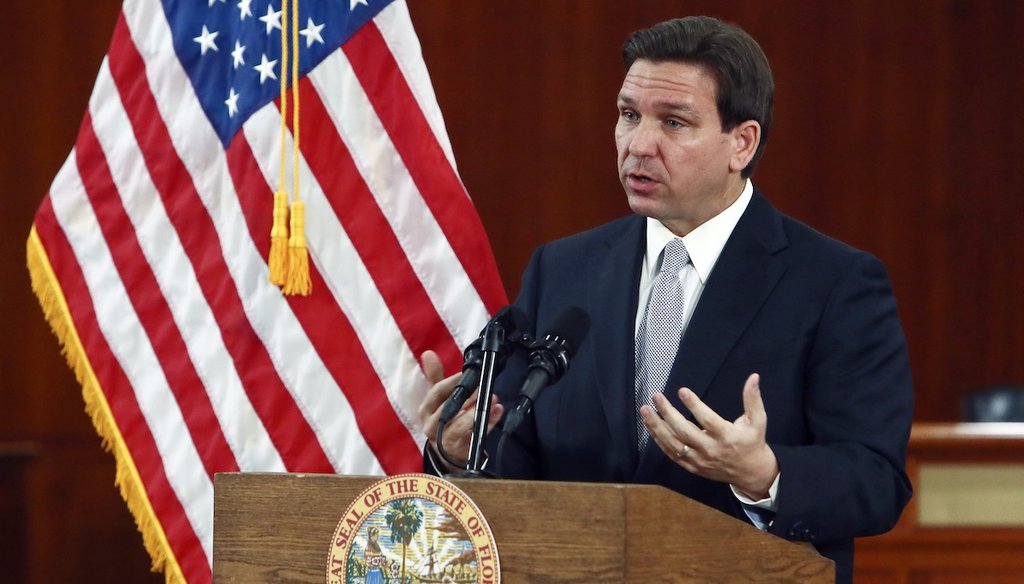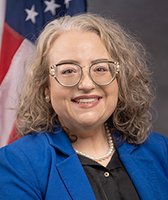Stand up for the facts!
Our only agenda is to publish the truth so you can be an informed participant in democracy.
We need your help.
I would like to contribute

Florida Gov. Ron DeSantis answers questions from the media in the Florida Cabinet following his State of the State address on March 7, 2023, at the Capitol in Tallahassee, Fla. (AP)
Gov. Ron DeSantis' State of the State address foreshadowed talking points in a potential 2024 presidential bid by highlighting Florida's "number one" record on some metrics while vowing that the state will do more in "the battle for freedom."
DeSantis didn't specifically mention some of the most attention-grabbing recent controversies, such as his battle with the College Board over the AP African American history course, but promised to keep delivering on his agenda.
"We will stand strong. We will hold the line," DeSantis said March 7. "We won't back down and I can promise you this: You ain't seen nothing yet."
DeSantis' address, which kicked off the two-month legislative session, could be his last before he announces a bid for the presidency. We analyzed a few statements by DeSantis about the crime rate, Florida's growth, immigration and gender-affirming care.
Hear a claim during the legislative session we should fact-check? Email us at [email protected].
"Florida's crime rate stands at a 50-year low."
DeSantis' talking point is accurate.
The Florida Department of Law Enforcement shares crime data from local law enforcement agencies with the FBI for its Uniform Crime Reporting program. The most recent state data available is from 2021. That year, Florida had a crime rate of about 1,952 crimes per 100,000 residents — nearly a 10% decrease from 2020.
That 2021 crime rate is the lowest recorded in Florida since 1971. It's worth remembering that the quality depends on the accuracy of the information supplied to the state, and local agencies have made errors before. The COVID-19 pandemic may have contributed to the decline, but its effects are still being studied.
Experts said most states are experiencing similar declines.
"By and large, state level crime rates follow similar patterns over time, with most states experiencing similar decreases in crime as Florida over the past 50 years," Lyndsay Boggess, a criminology professor at the University of South Florida, told PolitiFact.
"Florida is the fastest growing state in the nation. We ranked number one for net in-migration."
This is correct. Florida is the nation's fastest-growing state for the first time since 1957, according to the U.S. Census Bureau's Vintage 2022 population estimates. Florida's population increased by 1.9% to about 22.2 million between 2021 and 2022, surpassing Idaho, the previous year's fastest-growing state.
According to 2022 estimates, Florida ranks first in net migration with an estimated 444,484 people moving to the state from July 1, 2021, to July 1, 2022.
Florida slashed tolls "by 50% for Florida commuters for this calendar year, that will save some families more than $1,000."
The savings apply only to frequent users of toll roads.
The Florida Department of Transportation announced that in 2023 the state would automatically give Floridians with 35 or more toll transactions per month a 50% credit to their account. DeSantis proposed the savings and the Legislature enacted them.
The savings applies to drivers who use toll transponders, such as SunPass or other Florida-based transponders, and have accounts in good standing.
FDOT spokesperson Michael Williams told us that in January approximately 9,000 SunPass transponders each saved $100 or more.
Florida fought against illegal immigration by "banning sanctuary cities."
DeSantis signed a bill to ban "sanctuary cities" in 2019. The bill prohibited local governments from having sanctuary policies and required local jurisdictions to cooperate with federal immigration enforcement.
Although there is no official definition or list of "sanctuary cities," the term is typically applied to jurisdictions that limit their cooperation with federal immigration authorities. Many Florida jurisdictions were already cooperating with immigration authorities.
The city of South Miami and immigrant rights groups sued the state. In 2021, a federal judge ruled key parts of the law unconstitutional and said it was enacted partly based on "discriminatory motives."
The case is now before a federal appeals court, which heard arguments in the case March 2.
During his speech, DeSantis vowed to enhance employment verification, a nod to E-Verify, a federal government online system to verify prospective employees' eligibility to work in the United States. DeSantis signed a bill requiring public employers to use E-Verify in 2020; he wants legislators in this session to expand E-Verify to all employers, including private businesses.
"Our children are not guinea pigs for science experimentation, and we cannot allow people to make money off mutilating them."
DeSantis was referring to the state's restrictions on gender-affirming care, which include a ban on Medicaid billings for transition-related medical treatments and a ban on treatments for transgender children under 18. However, surgeries are not considered for prepubescent children, and they are not commonly recommended or provided to minors.
Gender-affirming treatments for young children can include social transitioning, such as using a preferred name or wearing certain clothes. As children age, they can be prescribed puberty blockers, and adolescents can receive hormonal therapies and, in rare cases, surgery.
The clinical services offered to children and adolescents, including puberty blockers and hormone therapy, are evidence-based. There are areas of gender-affirming treatment that are still being researched, including whether these services affect fertility. One reason there aren't many long-term studies on the effects of gender-affirming surgeries for youth is that these surgeries aren't done on children and rarely on teenagers.
RELATED: All of our fact-checks of DeSantis on the Truth-O-Meter
RELATED: PolitiFact's tracking of the campaign promises by DeSantis
RELATED: Fact-checking Ron DeSantis' book: What 'The Courage to Be Free' glosses over about his record
Our Sources
The Florida Channel, Joint Session and the State of the State Address, March 7, 2023
U.S. Census Bureau, New Florida Estimates Show Nation's Third-Largest State Reaching Historic Milestone, Dec. 22, 2022
Florida Department of Transportation, Toll Relief Program Begins January 1, Dec. 31, 2022
Courthouse News Service, 11th Circuit considers lifting block on Florida sanctuary city law, March 2, 2023
Florida Department of Law Enforcement, Crime in Florida Abstract, accessed March 7, 2023
Tampa Bay Times, Federal judge blocks Florida law banning 'sanctuary cities' Sept. 21, 2021
U.S. District Court Southern District of Florida, city of South Miami vs DeSantis, Sept. 21, 2021 Email interview with Lyndsay Boggess, professor at the University of South Florida' Department of Criminology, Feb. 27, 2023
Email interview with Gretl Plessinger, spokesperson for the Florida Department of Law Enforcement, Feb. 28, 2023
Email interview, Kristina Barrett, spokesperson for the U.S. Census Bureau, March 7, 2023
Email interview, Michael Williams, spokesperson for the Florida Department of Transportation, March 7, 2023















































